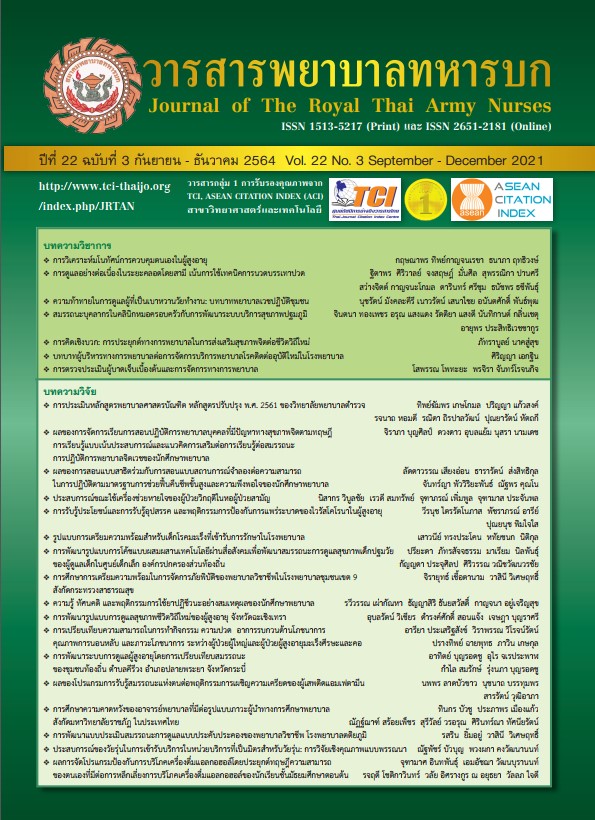Community Food Management for Caring of Persons with Diabetes Mellitus
Keywords:
Community food management, Qualitative study, Persons with Diabetes MellitusAbstract
This qualitative study aimed to study community food management to care for persons with diabetes mellitus and conditional factors that contribute to community-based dietary management to care for persons with diabetes mellitus. A purposive sampling approach was employed for informant selection. Informants were 137 people, divided into two groups, including 1) 74 primary informants who were persons with diabetes mellitus and family members, and have direct experience in managing a diabetic diet for persons with diabetes mellitus and their family members and 2) 63 general informants who involved in community food management to care for persons with diabetes mellitus and were a contributor to community food management. The main tool of research was the researcher. Data were collected by participant observation, in-depth interview, focus group discussion and field recording. Content analysis was used to analyze the data. The results showed that there was community food management to care for persons with diabetes mellitus, including 1) fostering local cultures for community food management of persons with diabetes mellitus, and 2) the promotion of community health management and dietary management of diabetes. There were two factors of success in the community food management system for persons with diabetes mellitus, including 1) the conditional factors contributing to the existence of the local culture were participatory management, and 2) the conditional factors that contributed to the expansion of community health management to dietary management of diabetes were the use of data and managing a secure environment that promoted learning.
Downloads
References
Division of Non Communicable Diseases. 5-Year National NCDs Prevention and Control Strategic Plan (2017-2021). Department of Disease Control of Thailand, Ministry of Public Health; 2017. (in Thai)
Payuha P, Mongkonchoo N, Siwina S. Health Behavioral Changes of Patients with Uncontrolled Diabetes Mellitus by a Nutritional Surveillance and Resistance Exercise Program. Journal of Preventive Medicine Association of Thailand. 2020; 10(1): 95-107. (in Thai)
Ministry of Public Health. Rates of new hypertensive and diabetic patients in Health Region 7, Khon Kaen Province. Division of Non Communicable Disease, Ministry of Public Health; 2021. (in Thai)
Chittayanunt K. et al. Self-Care Experience of Diabetic Patients in Tambol Lad Bua Khao, Ban Pong District, Ratchaburi Province. Nursing Journal of the Ministry of Public Health. 2013;23(3): 110-21. (in Thai)
Siangdung S. Self - Care Behaviors of Patients with Uncontrolled DM. The Southern College Network Journal of Nursing and Public Health. 2017; 1(4): 191-204. (in Thai)
Tepsuriyanont S & Chaichanawirote U. Dietary Control Behavior among Controlled and Uncontrolled Plasma Glucose Level of Diabetic Patients. Journal of Nursing and Education. 2018; 11(1): 32-49. (in Thai)
Dauvrin M, Lorant V, d’Hoore W. Is the chronic care model integrated into research examining culturally competent interventions for ethnically diverse adults with type 2 diabetes mellitus? A review. Evaluation & the Health Professions. 2015;38(4): 435-63.
World Health Organization. Community participation and tropical disease control in resource-poor setting. Geneva: Switzerland; 2004.
Jantasen O, Piaseu N, Maruo JS. Factors Related to Food Security of Older Persons with Type 2 Diabetes in a Community of Northeast Thailand. Nursing Journal of the Ministry of Public Health. 2017;27(2): 140-53. (in Thai)
Rochanavipart K, Nota W, Panya C. Health Literate Community Model for Health Behavioral Changes in Diabetic and Hypertensive Patients in Wiang Sa District, Nan Province. Journal of Preventive Medicine Association of Thailand. 2020; 2(10): 274-90. (in Thai)
Boonsawasdgulchai P, Nuntaboot K, Sangchart B. Data Utilization through Community Participation in Care of Persons with DM. Thai Journal of Nursing Council. 2011; 26(1): 29-40. (in Thai)
Spradley J. Participant observation. Orlando: Holt, Rinehart, & Winston. 1980.
Higginbottom GM, Pillay JJ, & Boadu NY. Guidance on Performing Focused Ethnographies with an Emphasis on Healthcare Research. The Qualitative Report. 2013; 18(9): 1-6.
Moser A and Korstjens I. Practical guidance to qualitative research: Sampling, data collection and analysis. European Journal of General Practice. 2018; 24(1): 9-18.
Guba EG & Lincoln YS. Fourth generation evaluation. Newbury Park, CA: Sage Publications. 1989.
Thongphet P. et al. Self-Care of Diabetic Patients in the Community on the Culture of Wisdom. Journal of Health and Nursing Research. 2019; 35(3): 112-19. (in Thai)
Chumweangvapee L and Piyabanditkul L. The Way to Promote Health for Diabetic Patients by Community: A CaseStudy at Tumbon Namphong, Namphong District, Khon Kaen Province. Journal of Nursing and Health Care. 2020; 38(3): 41-50. (in Thai)
Kasemsuk W and Koshakri R. The need to improve of Health Volunteer’s ability in Home Visit for Diabetes People in Communities. Journal of The Royal Thai Army Nurses. 2015; 16(2): 59-68. (in Thai)
Phormpayak D, Sattayawong W, Chaisa P. Lived Experience of Diabetes Patients Living in Phitsanulok Province. Journal of The Royal Thai Army Nurses. 2017; 18(3): 152-59. (in Thai)
Downloads
Published
How to Cite
Issue
Section
License
บทความหรือข้อคิดเห็นใดใดที่ปรากฏในวารสารพยาบาลทหารบกเป็นวรรณกรรมของผู้เขียน ซึ่งบรรณาธิการหรือสมาคมพยาบาลทหารบก ไม่จำเป็นต้องเห็นด้วย
บทความที่ได้รับการตีพิมพ์เป็นลิขสิทธิ์ของวารสารพยาบาลทหารบก
The ideas and opinions expressed in the Journal of The Royal Thai Army Nurses are those of the authors and not necessarily those
of the editor or Royal Thai Army Nurses Association.






